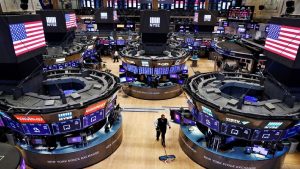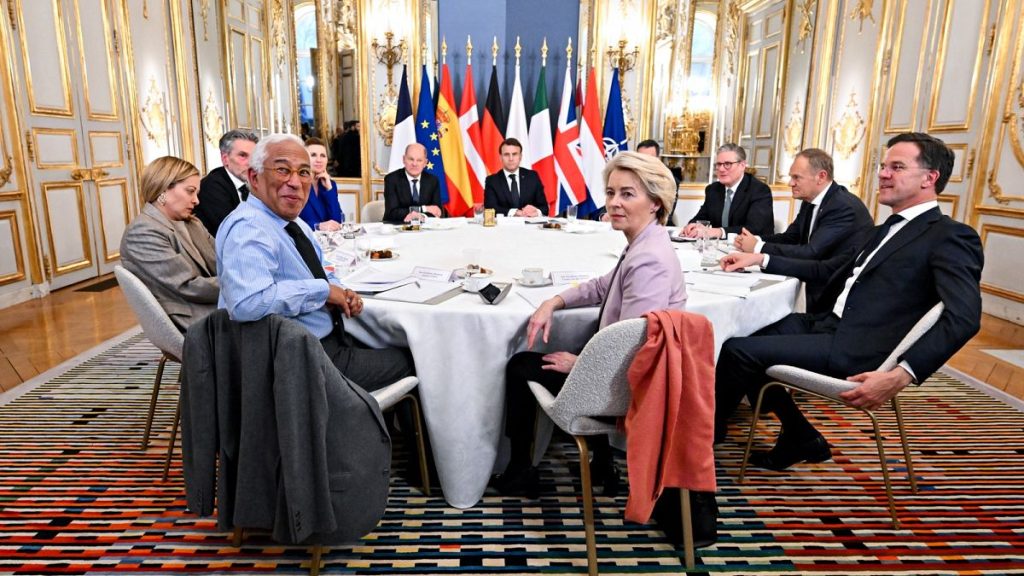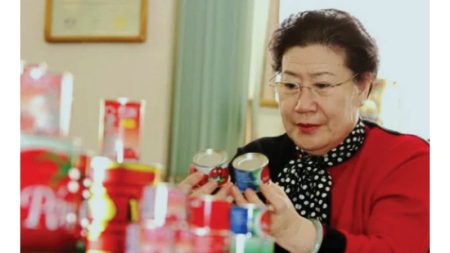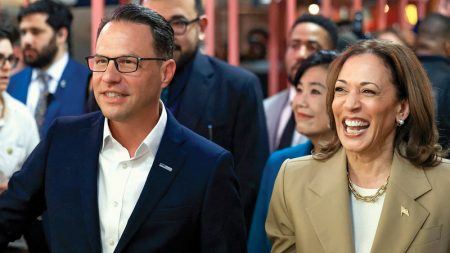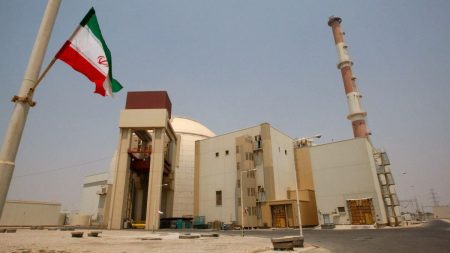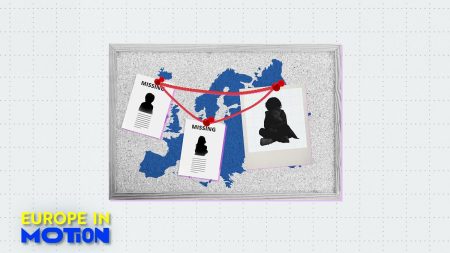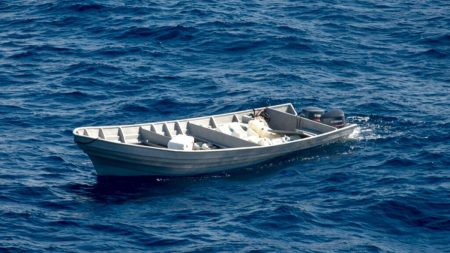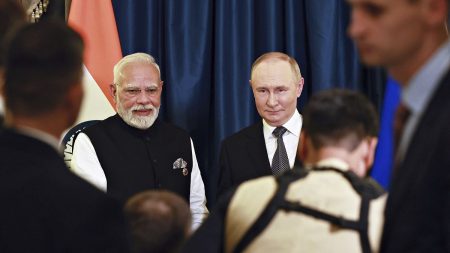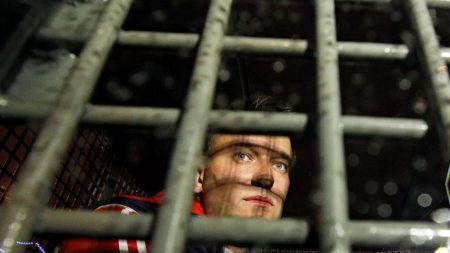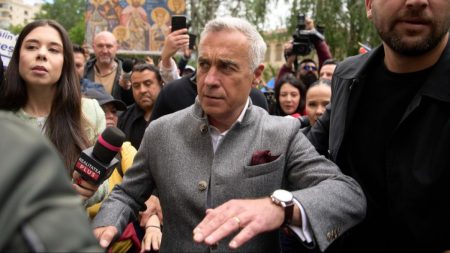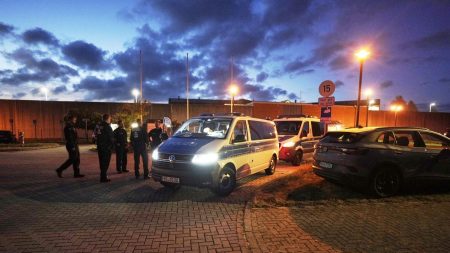Summarize this content to 2000 words in 6 paragraphs in Arabic
An informal summit in Paris among European leaders concluded without any concrete announcement, as the idea of deploying peacekeeping troops to Ukraine remains highly divisive.
ADVERTISEMENTEuropean leaders vowed on Monday to continue their joint support for Ukraine in the face of Russia’s invasion but failed to provide any new security guarantees that could make a difference amid Donald Trump’s push to launch negotiations with Russia.Trump’s declared intention to strike a deal to settle the three-year war in the coming weeks has shaken Europe to the core and stoked fears it could lead to painful concessions for Kyiv and leave the continent vulnerable to the Kremlin’s expansionism.The White House has sent a questionnaire to European allies asking, among other things, if they would be willing to deploy peacekeeping soldiers to the war-torn nation.French President Emmanuel Macron had previously voiced his openness to that scenario. On Monday, British Prime Minister Keir Starmer made it clear he was ready to do the same as long as America would provide a “backstop.””I’m prepared to consider committing British forces on the ground alongside others if there’s a lasting peace agreement. But there must be a US backstop because a US security guarantee is the only way to effectively deter Russia from attacking Ukraine again,” Starmer said at the end of an emergency summit in Paris.”We have to recognise the new era we’re in, not cling hopelessly to the comforts of the past. It’s time for us to take responsibility for our security, for our continent.”Danish Prime Minister Mette Frederiksen said her country was “open-minded” to the peacekeeping idea but cautioned there were “a lot of questions” that needed answers.”One very important thing is how are the Americans going to view these questions,” she said. “Are they going to back up Europeans in case of boots on the ground?”Asked about peace talks, Frederiksen said a “ceasefire is not automatically peace and it’s not automatically long-lasting peace” and urged European nations to “step up” their aid to Ukraine to put the country in the “best possible” position for future negotiations.German Chancellor Olaf Scholz was far more critical, saying any discussion on peacekeepers was “completely premature” and “highly inappropriate” at the present moment, given the war still rages on with all its brutality.”I’m even a little irritated by these debates,” Scholz said after leaving the meeting.Scholz welcomed the prospect of peace talks but warned against imposing a “dictated peace” on Ukraine. He also stressed the need to maintain a united Western front against the Kremlin. Allies have been rattled by the White House’s recent suggestions that it might soon begin withdrawing American troops from European soil.”There must be no division of security and responsibilities between Europe and the US, which means that NATO is based on the fact that we always act together and are at risk together and guarantee our security through this,” Scholz told reporters.”That must not be called into question. We must keep that in mind.”Spanish Prime Minister Pedro Sánchez insisted that any settlement between Ukraine and Russia should not “make the same mistakes as the past” and allow Vladimir Putin to annex foreign territory sometime again in the future. Sánchez said efforts to restore peace “must reinforce the European project and the multilateral order.”ADVERTISEMENT”We still don’t have the conditions for peace to start thinking about this model,” Sánchez said when asked if Spain would commit to boots on the ground. “Any security guarantees have to be a responsibility shared by all allies,” he added.Prior to the meeting, his Polish counterpart, Donald Tusk, had ruled out sending Polish soldiers to Ukraine as a part of a peacekeeping mission. Poland is NATO’s leader in defence spending per GDP and has received praise from the Trump administration.”We do not plan to send Polish soldiers to the territory of Ukraine, but we will support, also in terms of logistics and political support, countries that will possibly want to provide such guarantees in the future,” Tusk said before departing to Paris.Emergency summitThe meeting in Paris, hosted by Macron, was also attended by Italy’s Giorgia Meloni, the Netherlands’ Dick Schoof, Ursula von der Leyen, the president of the European Commission, António Costa, the president of the European Council, and Mark Rutte, the secretary general of NATO.ADVERTISEMENT”Today in Paris we reaffirmed that Ukraine deserves peace through strength. Peace respectful of its independence, sovereignty, territorial integrity, with strong security guarantees,” von der Leyen and Costa said in a coordinated message.”Europe carries its full share of the military assistance to Ukraine. At the same time, we need a surge in defence in Europe.”The summit was conveyed in reaction to the phone call between Donald Trump and Vladimir Putin last week, which saw both leaders agree to start negotiations to end the war “immediately.” The conversation broke the West’s three-year-long effort to isolate Putin, who has been accused of war crimes, and prompted a swift backlash among Europeans, who considered it an exclusion from the diplomatic process.Keith Kellogg, the US special envoy for Ukraine and Russia, later confirmed Europe would be consulted throughout the negotiations but would ultimately lack a seat at the table. Kellogg added he was working on “Trump time” and the American president expected to have a draft deal in a matter of “days and weeks.” ADVERTISEMENTUkrainian President Volodymyr Zelenskyy has said he would not accept “deals made behind our backs without our involvement” and backed Europe’s inclusion in the talks. Russia, though, has said he would prefer to keep Europeans out of the room.”I don’t know what they should do at the negotiating table. If they are going to wheedle out some sly ideas about freezing the conflict, while they themselves (…) will have in mind the continuation of the war, then why invite them there?” Sergei Lavrov, Russia’s foreign affairs minister, said on Monday.Lavrov, who is under EU sanctions, is expected to meet with US Secretary of State Marco Rubio on Tuesday in Saudi Arabia, marking the first time EU and Russian officials will meet in person since the Trump-Putin call. Rubio will be joined by Mike Waltz, the national security adviser, and Steve Witkoff, the Middle East envoy.The US-Russia talks will “yield no results,” Zelenskyy said during a visit to the United Arab Emirates (UAB). He is scheduled to travel to Saudi Arabia on Wednesday.ADVERTISEMENTThe fast pace of negotiations has put Europe on edge and prompted a flurry of diplomatic activity to showcase political unity and renewed determination.The Trump administration has made it clear it expects Europe to assume the overwhelming share of future support for Ukraine, both military and financial. The continent has signalled its readiness to take on a bigger role while maintaining the Western front that was erected in the early hours of the invasion.However, Trump’s latest actions, and the recent remarks by his Secretary of Defence, Pete Hegseth, indicate America no longer sees Europe as a priority and might soon begin pulling back military personnel from the continent to focus on China and the border with Mexico. Last week, Hegseth said any peacekeeping mission deployed to Ukraine would be deprived of NATO’s Article 5 of collective defence.
rewrite this title in Arabic European leaders stress support for Ukraine but disagree on peacekeeping mission
مقالات ذات صلة
مال واعمال
مواضيع رائجة
النشرة البريدية
اشترك للحصول على اخر الأخبار لحظة بلحظة الى بريدك الإلكتروني.
© 2025 جلوب تايم لاين. جميع الحقوق محفوظة.
